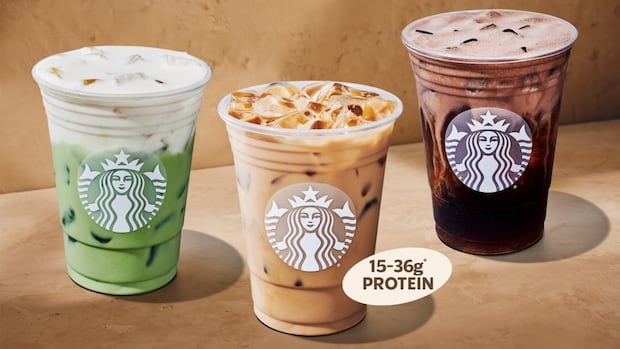Soon, even your Starbucks latte can come with protein. Is the trend healthy, or just big business?

The protein trend seems to be taking over the food industry, with offerings ranging from cereal to chips, ice cream, popcorn, and even candy. The latest addition to this trend is set to hit Starbucks stores across the U.S. and Canada later this month.
Starbucks will be introducing a line of lattes made with “protein-boosted” milk, as well as protein cold foam that can be added to any regular beverage. These new additions are said to offer between 15 to 36 grams of protein, catering to customers looking for a protein-packed boost in their morning coffee.
This move comes on the heels of Tim Horton’s release of a protein-packed latte, which uses a lactose-free, high-protein dairy beverage to provide 17 to 20 grams of protein per drink. The surge in protein-infused products can be attributed to the growing demand from health-conscious consumers and fitness enthusiasts.
The Business of Protein
Retail analyst Bruce Winder notes that the protein market is already worth billions of dollars and is growing at a rate of approximately seven percent per year. With more people focusing on their health and fitness, the demand for protein-rich products continues to rise.
The introduction of protein-enhanced beverages at Starbucks and Tim Hortons is expected to generate additional revenue for both chains. These offerings often come at a premium price, with consumers willing to pay extra for the added health benefits.
While the protein trend is currently on the upswing, some experts believe that it may eventually plateau or decline, similar to past diet trends like low-carb or sugar-free products. However, others argue that protein is a fundamental part of one’s diet and may have more staying power in the market.
Expert Opinion
Despite the popularity of high-protein products, some experts caution against overconsumption. Dietitian and assistant professor Melissa Fernandez believes that the protein craze is based on misinformation and exaggerated claims.
Fernandez highlights the discrepancy between the actual protein needs of individuals and the often overstated recommendations found online. While high-performance athletes may require more protein, the average person typically needs less than what is commonly promoted.
The “health halo” surrounding protein-enriched products can lead consumers to believe that these items are inherently healthier, when in reality, moderation and balance are key to a well-rounded diet.
As the food industry continues to capitalize on the protein trend, it’s essential for consumers to be informed about their dietary needs and make choices that align with their individual health goals.
Is the High-Protein Trend Here to Stay?
When it comes to nutrition trends, high-protein diets have been all the rage for quite some time. But are they really as beneficial as they’re made out to be?
The Truth About High-Protein Foods
While it’s true that protein is an essential macronutrient that helps to build and repair tissues in the body, not all high-protein foods are created equal. Some products on the market may have added sugars or other ingredients to mask the taste, or they may be highly processed, which can negate the health benefits of the protein content.
Consuming extra protein may not necessarily harm you, but it’s important to remember that a well-rounded diet should include a variety of fruits, vegetables, and other macronutrients to ensure overall health and wellness.
The Future of High-Protein Diets
Nutrition expert, Fernandez, believes that high-protein diets are here to stay, although they may evolve over time. While the current trend may be all about adding protein to everything from lattes to snacks, she predicts that a new wave of high-protein food options will emerge in the future.
So, whether you’re a fan of the high-protein craze or not, it’s clear that this trend is not going anywhere anytime soon. Be sure to stay informed about the latest research and make informed choices about your diet to support your overall health and well-being.




